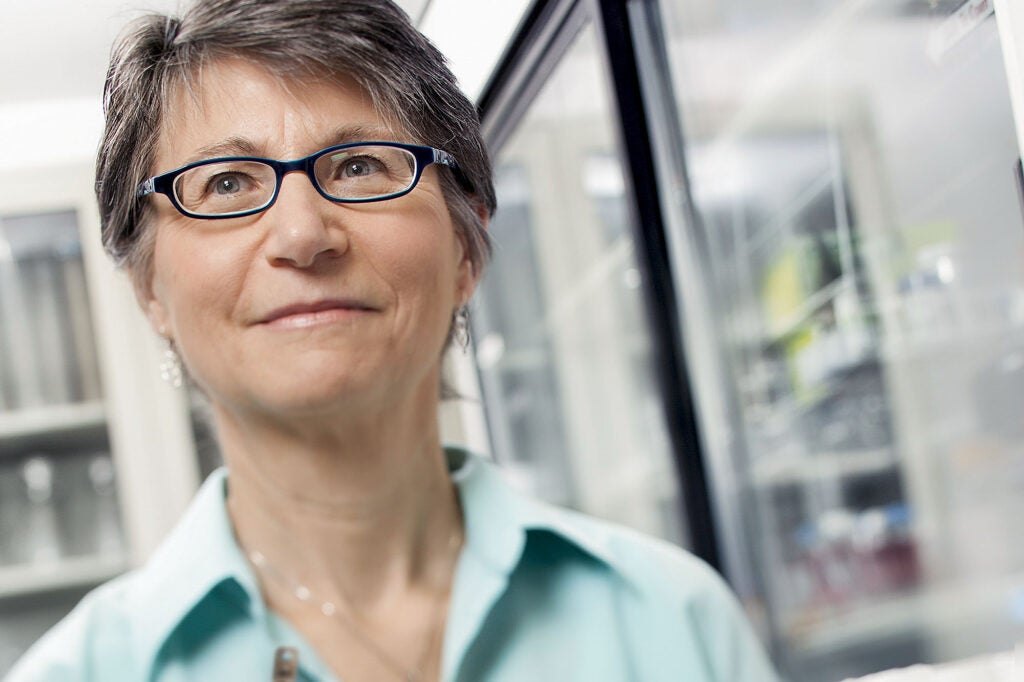
Dr. Judith White, professor emeritus in the School of Medicine, is part of an international team that developed a framework for speeding the development of drugs to battle pandemics. (UVA Health photo)
By Josh Barney, Reposted from UVA Today, 12/21/21
An international team of scientists has created a plan for an accelerated pipeline for developing drug cocktails to battle the COVID-19 pandemic. The pipeline could speed new and better treatments that the newly diagnosed and recently exposed could take at home to prevent serious illness.
The “proactive drug development strategy” could also offer a first line of defense against future pandemics, the researchers say. The approach would allow scientists to be ready with an arsenal of drugs that could be quickly moved into clinical trials when a dangerous new infection appears, whether a coronavirus or another pathogen. The goal: Make effective treatments available in weeks, not months or years.
“We need to proactively develop drug cocktails against virus families as a whole – for example, all coronaviruses – to be ready on day one if a new virus or variant emerges. The cocktail should be low-cost, easy to transport and distribute, and easy to self-administer – therefore available to people across the globe,” said researcher Judith M. White, a professor emeritus at the University of Virginia School of Medicine. “We hope that this concept of ‘smart drug cocktails’ – smart because of the choice of drugs for testing and computer modeling of their effectiveness in humans – will be the basis for a robust, coordinated effort against coronaviruses and other pathogenic viruses, such as Zika and Lassa fever viruses, just to name a few.”
Fast, Safe, Effective Pandemic Response
The new strategy comes from White, of UVA’s Departments of Cell Biology and Microbiology, Immunology and Cancer Biology; and colleagues in Seattle, at the University of Washington and the Fred Hutchinson Cancer Research Center; the University of Maryland; and MRI Global, as well as collaborators in Estonia, Finland and Norway. The scientists believe that prioritizing the development of drug cocktails – treatments that combine two or more medicines – would reduce the burden on health care systems and help prevent disease spread by limiting a virus’ ability to adapt to its hosts. This type of combination approach is already the norm for treating viruses such as HIV.
The researchers outline a five-point plan to accelerate the identification and administration of effective drug cocktails:
- Prioritize drugs that people could take at home, either by mouth or inhalation, after exposure or when symptoms first appear.
- Focus on drug combinations, rather than individual drugs, to reduce the chance viruses will become drug-resistant.
Prioritize drugs that are already approved or in advanced clinical trials, to accelerate how quickly their safety and effectiveness can be assured. - Focus on drugs that can be given to people at doses that will yield anti-viral effects without toxic side effects.
- Use advanced computer models to identify useful drug combinations and speed development.
To demonstrate the potential of computer modeling for this purpose, Dr. Joshua T. Schiffer of Fred Hutch developed a model to assess the potential clinical effectiveness of drug pairs for treating COVID-19. Pairing drugs, the researchers say, could make for treatments that are more effective than individual drugs alone. Identifying drugs with this type of “synergy,” they say, could potentially turn two medicines of only modest benefit into a potent treatment.
“Models that incorporate both the properties of the drugs and the biology of the virus spreading against an immune response can be used to identify the best way to dose promising treatments,” Schiffer said. “These models suggest strategically combining drugs may add substantial benefit.”
The scientists emphasize that better treatments for COVID-19 will not supplant the need for vaccination and are a complement to existing strategies. But they say their strategy could lead to better outcomes for patients who contract COVID-19 – or the next dangerous virus waiting in the wings.
“Having easily deployable, easily administered, inexpensive drug cocktails on the shelf when a new virus outbreak occurs would buy time from virus discovery to development and roll out of sequence-dependent countermeasures like vaccines and designer drugs, and could therefore blunt the initial stages of an epidemic,” White said.
Findings Published
The researchers have described their treatment-development strategy in a peer-reviewed article in the scientific journal mBio. The research team consisted of White, Schiffer, Rachel A. Bender Ignacio, Shuang Xu, Denis Kainov, Aleksandr Ianevski, Tero Aittokallio, Matthew Frieman, Gene G. Olinger and Stephen J. Polyak.
The work was supported by the National Institutes of Health, grants AI114776, AI121129 and K23AI129659; the Estonian research council, grant MOBTT39; the Sigrid Jusélius Foundation; and the Washington Research Foundation.
To keep up with the latest medical research news from UVA, subscribe to the Making of Medicine blog.
Filed Under: Featured, Media Highlights, Research

Comments